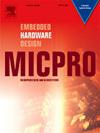Hardware security against IP piracy using secure fingerprint encrypted fused amino-acid biometric with facial anthropometric signature
IF 2.6
4区 计算机科学
Q3 COMPUTER SCIENCE, HARDWARE & ARCHITECTURE
引用次数: 0
Abstract
In the era of modern global design supply chain, the emergence of hardware threats is on the rise. Conventional hardware security techniques may fall short in terms of offering inferior tamper tolerance, unpersuasive digital ownership proof and weaker entropy, for sturdy intellectual property (IP) piracy detection and seamless IP ownership conflict resolution process. This paper presents a novel hardware security methodology based on IP seller's amino acid biometric and facial anthropometric features to generate an encrypted fused signature using multi-key driven non-invertible fingerprint, for providing sturdy detective countermeasure against IP piracy. The proposed approach exploits AES framework, where the generated key-translated fingerprint minutiae points of the IP seller is used as an encryption key. The proposed methodology is highly robust against hardware threats as it capable to generate large size covert security constraints for embedding, as digital evidence, in the IP design during high level synthesis (HLS). The results of the proposed approach on comparison with existing approaches, indicates enhanced tamper tolerance ability (against brute force attack) of upto 1.15E+77, lower probability of coincidence or false positive (against ghost signature search attack) of upto 6.72E-06, and stronger entropy of upto 2.06E-138, respectively.
使用安全指纹加密融合氨基酸生物特征与面部人体特征签名的硬件安全防止IP盗版
在现代全球设计供应链时代,硬件威胁的出现呈上升趋势。传统的硬件安全技术在提供较差的篡改容忍度、缺乏说服力的数字所有权证明和较弱的熵方面可能存在不足,无法实现可靠的知识产权盗版检测和无缝的知识产权所有权冲突解决过程。本文提出了一种基于IP卖家的氨基酸生物特征和面部人体特征的新型硬件安全方法,利用多密钥驱动的不可逆指纹生成加密融合签名,为IP盗版提供了可靠的检测对策。提出的方法利用AES框架,将IP卖家生成的密钥转换指纹细节点用作加密密钥。所提出的方法对硬件威胁具有很强的鲁棒性,因为它能够在高层次合成(HLS)期间在IP设计中生成大尺寸的隐蔽安全约束,作为数字证据。与现有方法相比,该方法的抗篡改能力(抗蛮力攻击)提高到1.15E+77,一致性和误报概率(抗幽灵签名搜索攻击)降低到6.72E-06,熵增强到2.06E-138。
本文章由计算机程序翻译,如有差异,请以英文原文为准。
求助全文
约1分钟内获得全文
求助全文
来源期刊

Microprocessors and Microsystems
工程技术-工程:电子与电气
CiteScore
6.90
自引率
3.80%
发文量
204
审稿时长
172 days
期刊介绍:
Microprocessors and Microsystems: Embedded Hardware Design (MICPRO) is a journal covering all design and architectural aspects related to embedded systems hardware. This includes different embedded system hardware platforms ranging from custom hardware via reconfigurable systems and application specific processors to general purpose embedded processors. Special emphasis is put on novel complex embedded architectures, such as systems on chip (SoC), systems on a programmable/reconfigurable chip (SoPC) and multi-processor systems on a chip (MPSoC), as well as, their memory and communication methods and structures, such as network-on-chip (NoC).
Design automation of such systems including methodologies, techniques, flows and tools for their design, as well as, novel designs of hardware components fall within the scope of this journal. Novel cyber-physical applications that use embedded systems are also central in this journal. While software is not in the main focus of this journal, methods of hardware/software co-design, as well as, application restructuring and mapping to embedded hardware platforms, that consider interplay between software and hardware components with emphasis on hardware, are also in the journal scope.
 求助内容:
求助内容: 应助结果提醒方式:
应助结果提醒方式:


